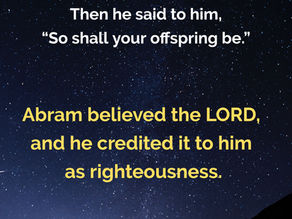Matthew 18:6-9 - Get A Rope
- Chad Werkhoven
- May 27, 2025
- 4 min read
Godly fear is the path to true peace and salvation.
Matthew 18:6-9 (NIV)
CONTEXT: Jesus has just famously called a child to Him, and tells His followers that 'whoever takes the lowly position of this child is the greatest in the kingdom of heaven. And whoever welcomes one such child in my name welcomes me.'
6 “If anyone causes one of these little ones—those who believe in me—to stumble, it would be better for them to have a large millstone hung around their neck and to be drowned in the depths of the sea. 7 Woe to the world because of the things that cause people to stumble! Such things must come, but woe to the person through whom they come! 8 If your hand or your foot causes you to stumble, cut it off and throw it away. It is better for you to enter life maimed or crippled than to have two hands or two feet and be thrown into eternal fire. 9 And if your eye causes you to stumble, gouge it out and throw it away. It is better for you to enter life with one eye than to have two eyes and be thrown into the fire of hell.
Canons of Dordt
Point 2 - Limited Atonement
Article 6: Unbelief, a Human Responsibility
However, that many who have been called through the gospel
do not repent or believe in Christ
but perish in unbelief
is not because the sacrifice of Christ offered on the cross
is deficient or insufficient,
but because they themselves are at fault.
Article 7: Faith God’s Gift
But all who genuinely believe and are delivered and saved
by Christ’s death from their sins and from destruction
receive this favor solely from God’s grace—
which God owes to no one—
given to them in Christ from eternity.
Summary
The Canons, echoing scripture, indicate that those who do not repent or believe in Christ have nobody to blame but themselves. It's not that the sacrifice of Christ is somehow deficient or insufficient, but because they themselves are at fault. They deserve the punishment prescribed for them: they will perish in unbelief. But just as in criminal law an accessory to a crime shares in some of the guilt, so to will those who cause people to stumble in their faith be held accountable for doing so.
We often rightly apply Jesus' warning to those who harm children, but Jesus makes it clear that the term little ones encompasses much more than just kids - it includes all those who believe in Jesus. And Jesus here isn't just thinking of those who lead people to completely fall away from their faith, but even those who cause believers to stumble, even if only for a moment.
Most of us have a visceral reaction to those who hurt children, so it makes sense that our Father does as well! He will passionately bring His wrath down upon anyone who messes with His children. But it doesn't seem like Jesus uses harsh enough language to describe what such people deserve; He just says woe to them. Although that word seems sort of benign, it's anything but. One lexicon describes the word as conveying a state of intense hardship or distress—‘disaster, horror.’
Jesus doesn't specify exactly what this woe - this intense distress - would include, but He does say it will be worse than having a large millstone hung around their neck and to be drowned in the depths of the sea. Such an experience would be an unimaginable horror. The phrase 'go to hell' has a somewhat muted effect because it gets used vulgarly so often, but in a very real sense, that's exactly what Jesus here says to those who cause harm to His children.
Dig Deeper
Jesus' straightforward condemnation of woe against the world because of the things that cause people to stumble is coupled to some pretty complex theology. He added, such things must come, but woe to the person through whom they come! It brings us right back to the issue we've already wrestled with so often this year: God's sovereignty vs. man's responsibility. God has ordained such things must come, but yet the guilt fully falls upon the people through whom it comes.
Once again, we turn to commentator NT France to help explain this:
The idea that people are responsible for their actions even though these are “necessary” is one which runs through both OT and NT (most notably in the story of Judas Iscariot; note a similar “woe” specifically directed at him in Matt. 26:24). The fact that a person is operating within a determined structure does not excuse them for their personal choices and decisions (Emphasis added).
With so much on the line, Jesus' hyperbolic advice makes sense: whatever it is in your life - even if it's your hand, foot or eye - that causes you to stumble (and by extension, causes those around you to stumble), cut it out of your life. Not doing so puts you at risk of being thrown into the eternal fire of hell.
It's hard to hear such stark language come from our Savior. We naturally gravitate toward His words of peace—of which there are so many—rather than those that evoke fear. Yet, this is a central message of the Bible: godly fear is the path to true peace and salvation:
Psalm 85:9 - Surely his salvation is near to those who fear him, that glory may dwell in our land.
Psalm 147:11 - But the Lord takes pleasure in those who fear him, in those who hope in his steadfast love.
Luke 1:50 - And his mercy is for those who fear him from generation to generation.
Philippians 2:12 - Therefore, my beloved, as you have always obeyed... work out your own salvation with fear and trembling.
ACKNOWLEDGE WHO GOD IS: Our Father, who zealously avenges those who harm His children;
ALIGN YOUR LIFE WITH GOD'S WILL: Pray that you will cut out anything in your life causing you or others to stumble;
ASK GOD FOR WHAT YOU NEED:
Read the New Testament in a year! Today: Romans 9




















Comments